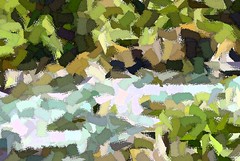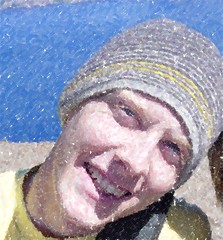Lake of Fire
It seems my copy of The Last Word and the Word After That has arrived today. But, I will not begin to read it until I finish my course this semester. Plus I'm trying to finish The Powers That Be as well as The Celtic Way of Evangelism. Boy, aint I an overachiever (translation: geek).
Since McLaren's final book of his trilogy is about the deconstruction of modern man's idea of hell, I eagerly await to see how my views are corrupted by this heretical genius.
During my doctor's visit this morning, I read something very interesting in Walter Wink's book that might correlate to the subject matter McLaren is tackling. Wink talks about the difference between Jesus and John the Baptist message of judgment. In John's preaching, God is depicted as verging on a counteroffensive mission against evil in which all the wicked will be wiped out. God will, in a sense, obliterate them by fire. This should not be taken as saying JB was not important or insignificant in his role in the Gospels. Jesus, by contrast, understood judgment not as an end to itself but as a beginning. The "lake of fire" was not to consume but purify, not annihilate but redeem. Reminds me of a song Nirvana performed:
For Wink, Jesus roots his judgment in redemption and reconciliation, a deep theme throughout the Biblical narrative. This divine judgment is used not to destroy but awaken people to the devastating truth about their lives. Through this lens, judgment becomes not the final word on a failed life, but the first word of a new creation. And so the end for the wicked or ungreatful is the last word, but there is a word after that.
Since McLaren's final book of his trilogy is about the deconstruction of modern man's idea of hell, I eagerly await to see how my views are corrupted by this heretical genius.
During my doctor's visit this morning, I read something very interesting in Walter Wink's book that might correlate to the subject matter McLaren is tackling. Wink talks about the difference between Jesus and John the Baptist message of judgment. In John's preaching, God is depicted as verging on a counteroffensive mission against evil in which all the wicked will be wiped out. God will, in a sense, obliterate them by fire. This should not be taken as saying JB was not important or insignificant in his role in the Gospels. Jesus, by contrast, understood judgment not as an end to itself but as a beginning. The "lake of fire" was not to consume but purify, not annihilate but redeem. Reminds me of a song Nirvana performed:
"Where do bad folks go when they die?
They don't go to heaven where the angels fly.
They go to a lake of fire and fry.
See 'em again on the 4th of July."
For Wink, Jesus roots his judgment in redemption and reconciliation, a deep theme throughout the Biblical narrative. This divine judgment is used not to destroy but awaken people to the devastating truth about their lives. Through this lens, judgment becomes not the final word on a failed life, but the first word of a new creation. And so the end for the wicked or ungreatful is the last word, but there is a word after that.





<< Home